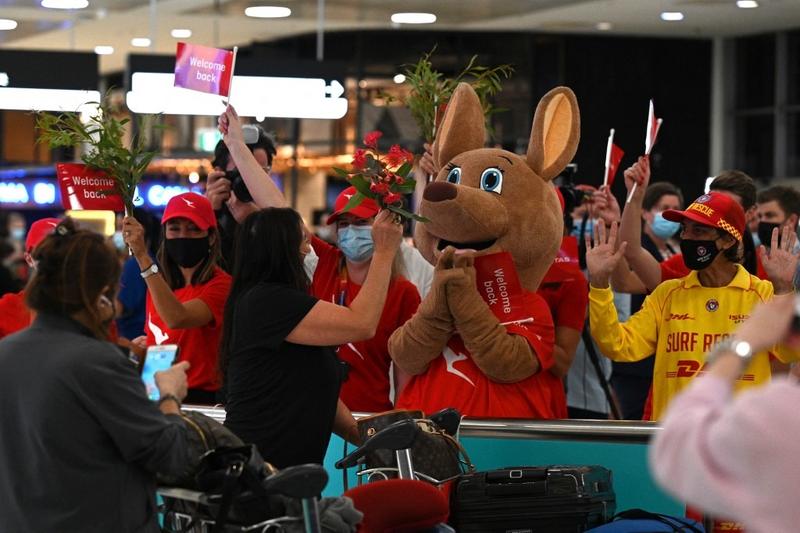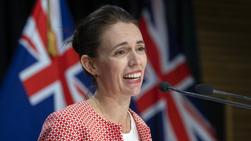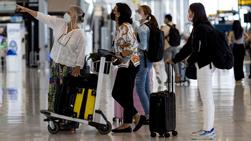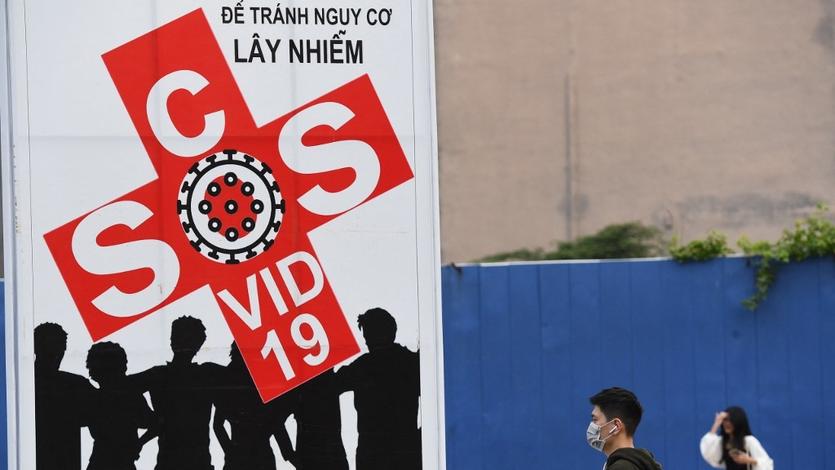 Staff offer flowers to passengers upon their arrival at the Sydney International Airport on Feb 21, 2022, as Australia reopened its borders for fully vaccinated visa holders, tourists, and business travelers. (SAEED KHAN / AFP)
Staff offer flowers to passengers upon their arrival at the Sydney International Airport on Feb 21, 2022, as Australia reopened its borders for fully vaccinated visa holders, tourists, and business travelers. (SAEED KHAN / AFP)
HANOI / BANGKOK / JAKARTA / DHAKA / SINGAPORE / WELLINGTON / TOKYO / NEW DELHI / SEOUL / KUALA LUMPUR / ULAN BATOR / VIENTIANE / CANBERRA - Australia reported more than 15,000 new COVID-19 cases on Monday when the country welcomed its first international tourists in almost two years after reopening its border.
Australia's international border reopened to travelers who are fully vaccinated against COVID-19 on Monday, marking an end to restrictions that were introduced to prevent the spread of the virus in March 2020.
Fifty-six flights were due to land in Australia in the 24 hours after reopening.
Dan Tehan, the federal minister for trade, tourism and investment, was at the Sydney international airport on Monday morning to welcome the first arrivals and said it was a milestone for Australia.
"The first passengers had a huge smile on their face even though they have been on a plane for what, 20-odd hours," he told Nine Network television. "The warmth of the welcome that the Australian people give our overseas visitors hasn't gone away."
The return of double vaccinated international visitors will reinvigorate Australia's tourism sector, which supports 660,000 jobs and contributed 60.4 billion Australian dollars ($43 billion) to the economy in 2018-19, according to Tehan's media release on Monday.
The country on Monday reported more than 15,000 new coronavirus infections and 17 deaths - seven in New South Wales, six in Queensland, three in Victoria and one in the Australian Capital Territory.
ALSO READ: Australia to welcome tourists for first time under COVID-19
 A teacher holds online classes for her students at one of the schools that have been shut down amid a surge in coronavirus infections at New Eskaton area in Dhaka, Bangladesh on Feb 1, 2022. (MAHMUD HOSSIAN OPU / AP)
A teacher holds online classes for her students at one of the schools that have been shut down amid a surge in coronavirus infections at New Eskaton area in Dhaka, Bangladesh on Feb 1, 2022. (MAHMUD HOSSIAN OPU / AP)
Bangladesh
The Bangladeshi government will not extend its COVID-19 restrictions once they expire on Feb 22 but mask mandates remain as usual.
Cabinet Secretary Khandker Anwarul Islam made the announcement Sunday, saying the existing restrictions related to COVID-19 will end Tuesday.
"There will be no further restrictions in effect beyond Feb 22," he told journalists in Dhaka.
According to him, masks will remain mandatory for attending any indoor or outdoor events.
Amid surging cases with the Omicron variant of COVID-19 in capital Dhaka and elsewhere in the Asian country, the Bangladeshi government on Jan 13 imposed 11-point restrictions till Feb 7, then extended them up to Feb 21.
According to the official, the secondary and higher educational institutes will reopen on Feb 22 after a closure of one month.
 A civil authority worker sprays disinfectant inside a classroom ahead of the reopening of schools closed as a preventive measure to curb the spread of the COVID-19 coronavirus, in Mumbai on Jan 22, 2022. (PUNIT PARANJPE / AFP)
A civil authority worker sprays disinfectant inside a classroom ahead of the reopening of schools closed as a preventive measure to curb the spread of the COVID-19 coronavirus, in Mumbai on Jan 22, 2022. (PUNIT PARANJPE / AFP)
India
India's COVID-19 tally rose to 42,838,524 on Monday, as 16,051 new cases were registered during the past 24 hours across the country, the Health Ministry's latest data showed.
Besides, as many as 206 deaths due to the pandemic since Sunday morning took the total death toll to 512,109.
There are still 202,131 active COVID-19 cases in the country despite a fall of 22,056 active cases during the past 24 hours. This was the 28th consecutive day when the number of active cases declined in the country.
Indonesia
Indonesia on Sunday confirmed 48,484 new COVID-19 cases, raising the total tally to 5,197,505, the Health Ministry said.
According to the ministry, the death toll from COVID-19 has risen by 163 to 146,365.
ALSO READ: Israel to offer Astra's Evusheld to immunocompromised people
 People wearing protective masks to help curb the spread of the coronavirus walk on the street in snow on Feb 10, 2022, in Tokyo. (EUGENE HOSHIKO / AP)
People wearing protective masks to help curb the spread of the coronavirus walk on the street in snow on Feb 10, 2022, in Tokyo. (EUGENE HOSHIKO / AP)
Japan
A vast majority of Japanese think the rollout of booster shots against COVID-19 is too slow and give mixed reviews to Prime Minister Fumio Kishida's handling of the coronavirus pandemic, including last week's decision to ease border rules, polls show.
Anger over the Japanese government's handling of the pandemic helped sink the administration of Kishida predecessor Yoshihide Suga, and Kishida faces a crucial election for the upper house of parliament in July.
About 73 percent of respondents to a Kyodo news agency opinion poll over the weekend felt Japan's rollout of booster shots has been far two slow, though 54.1 percent approved of how it had tackled the coronavirus overall.
As of Friday, only some 12 percent of the population had received booster shots even though nearly 30 percent of the country is 65 or older and at greater risk without the protection of the booster, even with Kishida repeatedly promising to accelerate the programme. read more
Kishida told a news conference last week that he has yet to receive the booster, but should get one early in March.
Nearly half of respondents to the two-day telephone survey said it was "too early" to loosen border controls, which have among been the strictest among wealthy nations but were slammed by businesses and educators, a move set to take place in stages from March 1.
About 45.7 percent said the decision, which will open borders to foreigners except for tourists, came too early, Kyodo said, while 34.9 percent said it was "appropriate" and 16.3 percent saw it as too late.
Laos
The Lao government has vowed to expedite a nationwide vaccination program for children aged 6 and over against COVID-19, starting on Monday.
The program is part of the government's efforts to ensure that people of all ethnic groups are immunized against COVID-19 and are protected against the Omicron variant in particular, as the variant is much more transmissible than the Delta variant, the local daily Vientiane Times reported on Monday.
Vaccinations will take place in the provinces of Huaphan, Xieng Khuang, Oudomxay, Savannakhet and Xaysomboun from Feb. 21 to March 4, according to a notice issued by the Prime Minister's Office.
In other provinces and the Lao capital Vientiane, vaccination rollout is scheduled for March 4 to 19. However, provinces that are ready can start inoculating children on Feb. 21.
 Voters wearing face masks as they line up to enter a voting center on the outskirts of Malacca, Malaysia, on Nov 20, 2021. (VINCENT THIAN / AP)
Voters wearing face masks as they line up to enter a voting center on the outskirts of Malacca, Malaysia, on Nov 20, 2021. (VINCENT THIAN / AP)
Malaysia
Malaysia reported 26,832 new COVID-19 infections as of midnight Sunday, bringing the national total to 3,221,680, according to the Health Ministry.
There are 68 new imported cases, with 26,764 being local transmissions, data released on the ministry's website showed.
A further 37 deaths have been reported, bringing the death toll to 32,347.
Mongolia
Mongolia registered 309 new COVID-19 infections over the past 24 hours, the lowest since Jan 3, bringing the national tally to 462,406, the country's health ministry said Monday.
Meanwhile, no more COVID-19 related deaths were recorded in the past day, and the country's death toll remains at 2,087, it said.
So far, 66.8 percent of the country's 3.4 million people have received two COVID-19 vaccine doses, while more than 1 million people over 18 received one booster.
 New Zealand Prime Minister Jacinda Ardern announces the country will move to red traffic light setting as part of new COVID-19 restrictions during a press conference in Wellington on Jan 23, 2022. (MARK MITCHELL / NEW ZEALAND HERALD VIA AP)
New Zealand Prime Minister Jacinda Ardern announces the country will move to red traffic light setting as part of new COVID-19 restrictions during a press conference in Wellington on Jan 23, 2022. (MARK MITCHELL / NEW ZEALAND HERALD VIA AP)
New Zealand
New Zealand will lift COVID-19 vaccine mandates and social distancing measures after the Omicron peak has passed, Prime Minister Jacinda Ardern said on Monday, as protesters occupying the parliament grounds again clashed with police.
Inspired by truckers' demonstrations in Canada, thousands of protesters have blocked streets near the parliament in the capital Wellington for two weeks with trucks, cars and motorcycles, piling pressure on the government to scrap vaccine mandates.
Ardern refused to set a hard date, but said there would be a narrowing of vaccine requirements after Omicron reaches a peak, which is expected in mid to late March.
 Police arrest people protesting against coronavirus mandates at Parliament in Wellington, New Zealand on Feb 10, 2022. (MARK MITCHEEL / NZ HERALD VIA AP)
Police arrest people protesting against coronavirus mandates at Parliament in Wellington, New Zealand on Feb 10, 2022. (MARK MITCHEEL / NZ HERALD VIA AP)
The demonstrations began as a stand against the vaccine mandates but have since spread to become a wider movement against Ardern and her government.
On Monday, eight people were arrested for disorderly behaviour and obstruction, with human waste thrown over some police officers.
New Zealand has reported about 16,000 cases of COVID-19 and 53 deaths since the pandemic began, relatively low by global standards, but an Omicron-fuelled outbreak has pushed the current seven-day average of new infections to more than 1,600 cases daily.
The parliament stand off is testing Ardern, who garnered plaudits for keeping the country virtually virus-free over the last two years but is facing criticism for continuing strict restrictions and delaying border reopening plans.
Singapore
Singapore reported 15,283 new confirmed cases of COVID-19 on Sunday, bringing the total tally to 582,638.
Of the new cases, 3,114 cases were detected through PCR (polymerase chain reaction) tests and 12,169 through ARTs (antigen rapid tests), according to statistics released by the Ministry of Health.
South Korea
South Korea has logged more than 500,000 breakthrough COVID-19 infections, the health authorities said Monday.
The number of people who tested positive for COVID-19 after receiving two vaccine doses came in at 516,431 as of Feb. 13, up from 367,927 a week earlier, according to the Korea Disease Control and Prevention Agency (KDCA).
It accounted for 1.18 percent of the fully vaccinated people totaling 43,726,034 out of the Asian country's some 52 million population.
South Korea reported 95,362 more COVID-19 cases as of midnight Sunday compared to 24 hours ago, raising the total number of infections to 2,058,184, the health authorities said.
The daily caseload was down from 104,827 in the previous day due to fewer tests over the weekend, falling below 100,000 in four days, according to the KDCA.
 Passengers look at the flight schedule screen at Suvarnabhumi Airport in Bangkok on Feb 1, 2022, as Thailand resumes its quarantine free-travel scheme for vaccinated travelers.
(JACK TAYLOR / AFP)
Passengers look at the flight schedule screen at Suvarnabhumi Airport in Bangkok on Feb 1, 2022, as Thailand resumes its quarantine free-travel scheme for vaccinated travelers.
(JACK TAYLOR / AFP)
Thailand
Thailand on Sunday reported 18,953 new COVID-19 cases during the last 24 hours, with the daily case tally rising for the fifth consecutive day to reach its highest level since Aug 22, 2021, official data showed.
The new cases brought the number of total infections in the Southeast Asian country to more than 2.71 million, according to the Center for COVID-19 Situation Administration (CCSA), the country's COVID-19 task force.
The country also reported 30 new deaths over the last 24 hours, taking the total number of fatalities to 22,624, according to the CCSA.
The capital Bangkok logged 2,690 new cases during the last 24 hours, the most among regions, followed by the surrounding provinces of Samut Prakan and Chonburi.
 A man passes walks past a billboard on the coronavirus in Ho Chi Minh City on Dec 4, 2021. (NHAC NGUYEN / AFP)
A man passes walks past a billboard on the coronavirus in Ho Chi Minh City on Dec 4, 2021. (NHAC NGUYEN / AFP)
Vietnam
Vietnam registered a fresh record of 47,200 new COVID-19 infections on Sunday, an increase of 4,761 cases from the previous high reported on Friday, according to its Ministry of Health.
The new infections, logged in 63 localities nationwide, included 47,192 domestically transmitted and eight imported.
The epidemic hotspot, the capital Hanoi logged over 5,100 daily infections on Sunday, marking its highest single-day tally, remaining the locality with the highest number of COVID-19 cases. Other northern localities with a high number of cases included Bac Ninh province with 2,360 cases and Phu Tho province with 1,981 cases.
The infections brought the total tally to 2,787,493 with 39,501 deaths.
Around 191.4 million doses of COVID-19 vaccines have been administered in the Southeast Asian country, including 174.6 million shots for people aged 18 and above, said the ministry.


